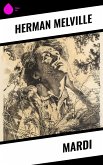In "Mardi," Herman Melville embarks on a complex narrative voyage, blending elaborate language and philosophical musings within a richly woven tapestry of allegory. Set against the backdrop of an imaginary archipelago, the novel unfolds through the eyes of the protagonist, Taji, who grapples with existential dilemmas and the nature of reality, reflecting Melville's own struggles with identity and purpose. The literary style is notable for its intricate prose and intertextual references, resonating with themes of social critique and the quest for truth, positioning "Mardi" within the broader context of 19th-century American literature that seeks to understand both the self and society. Herman Melville, an esteemed American novelist and poet, drew inspiration from his own maritime experiences and travel encounters, which are central to the narrative structure of "Mardi." The author's previous works, such as "Moby-Dick," laid the groundwork for his exploration of existential themes and the human condition, while his interest in romanticism and transcendental philosophy informed his approach in "Mardi," revealing a deep engagement with the complexities of human nature and the critique of societal conventions. Readers who seek a profound exploration of the interplay between reality and illusion will find "Mardi" a remarkable journey. Melville's imaginative storytelling invites reflection on the larger human experience, making it a compelling read for those interested in philosophical literature and the evolution of American narrative art.
Dieser Download kann aus rechtlichen Gründen nur mit Rechnungsadresse in A, B, BG, CY, CZ, D, DK, EW, E, FIN, F, GR, H, IRL, I, LT, L, LR, M, NL, PL, P, R, S, SLO, SK ausgeliefert werden.










